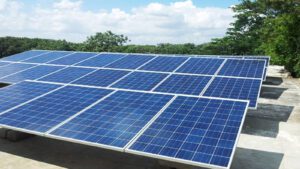
1. Introduction
The economic landscape is ever-changing, with inflation being a significant concern for households and businesses alike. Amidst rising costs and an uncertain financial future, renewable energy, particularly solar power, has emerged as a beacon of hope. This article delves into the intricate relationship between solar power and its potential to mitigate the impacts of inflation, offering a sustainable and economically sound solution.
2. Understanding Inflation
Inflation, in its simplest form, is the rate at which the general level of prices for goods and services is rising, subsequently eroding purchasing power. It’s an economic phenomenon that touches every aspect of life, from the cost of groceries to utility bills. In recent times, energy costs have been a significant driver of inflationary trends, making the search for alternative energy sources more crucial than ever. This is where solar power steps into the limelight, offering not just energy independence but also a shield against the fluctuating costs of traditional energy sources.
3. The Rise of Solar Power
In the last decade, solar power has transitioned from a niche, eco-conscious choice to a mainstream energy source. This shift is attributed to advancements in solar technology, resulting in more efficient and affordable solar panels. Additionally, the growing awareness of environmental issues and the urgency to reduce carbon footprints have propelled solar energy to the forefront of renewable energy solutions. The attractiveness of solar power lies in its ability to provide a stable and sustainable energy source, detached from the volatility of conventional energy markets.
2. Solar Energy and Cost Efficiency: By the Numbers
- Reduction in Energy Bills: Solar panel installations can lead to an average reduction of 20-30% in monthly electricity bills for Singaporean households.
- Long-Term Savings: Over a period of 25 years, the average solar panel system in Singapore can generate savings upwards of SGD 30,000, considering the average electricity consumption patterns.
- Return on Investment (ROI): With the current government incentives, the ROI period for solar panel installation in Singapore has reduced to approximately 7-8 years.
3. First Solution Group’s Impact in Numbers
- Installation Efficiency: First Solution Group has successfully installed solar panels that, on average, perform 10-15% more efficiently than standard installations, thanks to advanced technology and expert installation techniques.
- Client Savings: Our clients have reported an average decrease of 25% in their energy bills post solar panel installation.
- Project Scale: Over the past year, First Solution Group has completed solar installations capable of generating a combined total of over 5 Megawatts of power, significantly contributing to Singapore’s renewable energy targets.
Get Started with First Solution Group Today
Are you ready to take a step towards a sustainable and economically sound future with solar energy? Contact First Solution Group today to explore how solar power can benefit your home or business. Our team of experts is equipped to guide you through every step of the process, from initial consultation to installation and maintenance. By choosing First Solution Group, you’re not just investing in reliable solar solutions; you’re also contributing to a greener Singapore and safeguarding against the financial uncertainties of inflation. Don’t wait to make a positive change – reach out to us now and join the solar revolution. Together, let’s harness the power of the sun and pave the way for a brighter, more sustainable future.
4. Solar Panels as a Hedge Against Inflation
Solar power’s role in combating inflation is multifaceted. Firstly, by reducing dependency on traditional energy sources, households and businesses insulate themselves from the price volatility associated with fossil fuels. This energy independence is crucial in times of economic instability. Secondly, solar power contributes to a more diversified and resilient energy portfolio for a nation, reducing the collective impact of inflation. By investing in solar energy, individuals and businesses not only secure their energy future but also contribute to a broader economic stability.

5. Government Incentives and Solar Investments in Singapore
Singapore, with its commitment to sustainable development, offers various incentives to promote solar panel installations. The government’s initiatives, such as the SolarNova programme, aim to accelerate the adoption of solar power across the city-state. Through these initiatives, both homeowners and businesses can access subsidies and grants, reducing the financial burden of solar panel installation. Additionally, the government’s partnership with private sectors under the SolarRoof and SolarLand schemes further encourages the deployment of solar photovoltaics on rooftops and unused state land. These incentives not only support individuals and companies in their transition to green energy but also align with Singapore’s long-term vision of reducing carbon emissions and achieving energy resilience.
- SolarNova Programme: Under this initiative, the Singapore government aims to increase solar capacity to 350 MWp by 2020, with First Solution Group being a key facilitator in achieving these targets.
- Enhanced Central Intermediary Scheme: This scheme allows for excess solar energy to be sold back to the grid, offering an additional financial return for solar panel owners.
6. Choosing the Right Solar Panel System in Singapore
In Singapore’s urban landscape, space constraints are a significant consideration when installing solar panels. The efficiency of solar panels becomes paramount in such settings. In Singapore, monocrystalline panels are often preferred for their higher efficiency and space-saving qualities. The decision between grid-tied and off-grid systems is also crucial. Grid-tied systems are more common in Singapore, allowing homeowners to sell excess energy back to the grid, offsetting their electricity costs. The Energy Market Authority (EMA) of Singapore facilitates this through the Enhanced Central Intermediary Scheme, encouraging energy sharing. Selecting the right solar panel system in Singapore involves considering factors like roof orientation, shading, and energy needs, making consultations with local solar energy experts essential for optimal setup.
7. Installation Process and Maintenance in Singapore
The installation of solar panels in Singapore is governed by specific regulations to ensure safety and efficiency. The process typically begins with a site assessment by certified solar installers, who then design a system tailored to the building’s architecture and energy requirements. Following approval from relevant authorities, installation can proceed, often completed within a few days for residential properties. Maintenance in Singapore’s humid climate involves regular cleaning and checks for any corrosion or damage. Most solar panel systems in Singapore come with monitoring technology, allowing for real-time tracking of energy production and prompt identification of any issues.
8. Environmental Benefits in Singapore
Adopting solar power in Singapore goes beyond economic savings, significantly contributing to environmental conservation. As a densely populated city-state with limited natural resources, Singapore’s shift towards solar energy plays a crucial role in reducing reliance on imported fossil fuels and lowering greenhouse gas emissions. The widespread adoption of solar panels aligns with Singapore’s Sustainable Development Blueprint, which aims to promote a cleaner and greener environment. Solar energy’s clean, renewable nature is especially beneficial in urban settings like Singapore, where reducing the urban heat island effect and air pollution is critical for enhancing the quality of life.
- Carbon Footprint Reduction: Every kilowatt-hour (kWh) of solar energy generated in Singapore reduces carbon emissions by approximately 0.4 kg, translating to significant environmental benefits over the lifetime of a solar panel system.
- Sustainability Goals: Singapore’s commitment to the Paris Agreement involves a 36% reduction in emissions intensity from 2005 levels by 2030, with solar energy being a key contributor.
9. Conclusion: Solar Power as a Sustainable Economic Solution in Singapore
In conclusion, solar panels represent a robust solution to the economic challenges posed by inflation, especially in the context of Singapore. By providing energy independence, stable electricity costs, and aligning with government incentives, solar power stands as a pillar of sustainable economic planning. Moreover, it contributes significantly to Singapore’s environmental goals, cementing its role as an essential component of the city-state’s future energy landscape. As we move forward, the continued growth and integration of solar technology in Singapore’s urban fabric will not only combat inflation but also pave the way for a more sustainable and resilient economy.
10. The Role of Private Enterprises: First Solution Group’s Contribution to Singapore’s Solar Landscape
In the rapidly evolving solar energy sector of Singapore, private enterprises play a pivotal role in advancing the adoption and implementation of solar technologies. First Solution Group, as a key player in this realm, exemplifies the impact that private companies can have in driving the transition towards sustainable energy solutions.
Customised Solar Solutions for Diverse Needs
Understanding the diverse needs of its clientele, First Solution Group offers customised solar solutions that range from residential installations to large-scale commercial projects. This adaptability not only demonstrates the company’s technical prowess but also its dedication to meeting the specific energy requirements of different sectors in Singapore.
